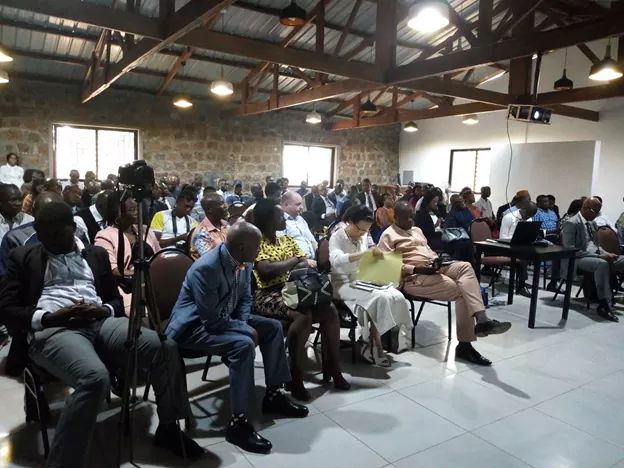The Sierra Leone Chamber of Commerce, Industry and Agriculture (SLCCIA) has on Tuesday March 3, 2020, held a business lunch on the 2020 Finance Act at Lacs Villa Hotel in Freetown.
The business lunch was well attended by the members of the private and public sectors including representatives of the Ministry of Finance, National Revenue Authority (NRA) and Members of Parliament, among others. The theme of the business lunch is “Finance Act 2020 Made Simple.”
The purpose of the business lunch is to engage members of the Chamber on the issues of taxation and National social security and Insurance Trust (NaSSIT) and other issues.
It could be recalled that under the theme: “Fiscal Consideration for human capital development and job creation”, the Minister of Finance delivered the government budget and statement of economic and financial policies for the 2020 financial year, which included among other things, the imposition and alteration of taxation. The total resource envelope for 2020 budget is proposed to be Le 8.24 trillion. It comprises domestic revenue figure Le 6. 47 trillion [Le 5.30 trillion in 2019], budget support of Le 1.0 trillion and domestic financing of Le 873.9 billion.
In his presentation, Consultant and Manager of Taxation Advisory Services, of Moore Sierra Leone, an accounting firm, Christian S. Asgill highlighted that the various taxes which will contribute towards achieving the projected Domestic Revenue target includes: Income Tax – Le 2.20 trillion; Goods and Services Tax – Le 1.24 trillion; Customs and Excise Duties – Le 1.46 trillion; Royalty and Licenses on Minerals and Petroleum – Le 322.1 billion; Royalty and Licenses on fisheries – Le 122.7 billion; Parastatals Dividends – Le 60.0 billion; Government Departments including Royalty on Timber Exports – 789.7 billion and Road User Charges and Vehicles Licenses – Le 124.8 billion.
Speaking on the issues that are not in the interest of the business community, Consultant Asgill said, according to the 2018 Finance Act, the retained earnings in excess of 50% of the current period post-tax profit will be taxed at 30 % dividend payment which attracts withholding tax at 10%, noting that the 25% of tax retained earnings in the current Act is not in line with the provision in the 2018 Finance Act. “We don’t know now if the Corporate Income Tax is 30 % or 25 % because the 2018 Act says that if you fail to pay out dividend of 50% then they have to tax you 30%,” he said.

He said that normally with all tax administration, the key objective is to raise more revenue. “But we may want to consider the policy and the approach the tax administration is taking to achieve it,” he said. He disclosed that most companies frown at the retained earnings because not every year can be as successful, and the moment companies or businesses make profit, then the government would demand for it.
The President of SLCCIA, Christopher Foster, said that the Finance Acts 2020 affects every business in the country. “Realising the importance of taxes and financial policies on business, we decided to bring all the business communities together so that we will help them understand what is written in the Act.”
He explained that when the Finance Act was published, very few people find time to actually read and relate it provisions to the businesses they operate, adding that businessmen went blindly along with the idea that there is a Finance Act, but they did not really understand how it affects them. “So we thought it was very important we give them an insight on how the Act affects their business in terms of their profit, what they can retain and that is an integral part.”











